一般现在时,现在进行时,一般将来时
(完整版)一般现在时、一般过去时、一般将来时、现在进行时

初中语法一般现在时、一般过去时、一般将来时、现在进行时四种时态的区别名称定义时间动词形式时间词always、sometimes、usually、1、动词原形often、every表示经常性或习2、第三人称单一般现在时平时、经常惯性的动作数morning、动词后-s/esevery week、twice a week等等now、rightnow、表示此时此刻或at theam/is/are+动词现在进行时现阶段正在进行正在进行ingmoment、的动作look、listen等in the future、1、will/shall+动next词原形表示将来发生的week/month、一般将来时即将、计划2、am/is/are事tomorrow、+going to+动词in two weeks原形等等ago、yesterday、表示过去某一时1、V-ed(规则last week/候或某一段时间过去(与现动词)一般过去时night、所发生的事情或在无关的)2、不规则动词just now、存在的状态变化once upon atime等注意:1、一般现在时——第三人称单数的动词变化规则:1)大多数动词在词尾加“S”如:stop-______; make-______read-______; play-______2)以辅音字母加“y”结尾的,要先将“y”变为“i”,然后在加“es”如:fly-______;carry-______study-______; worry-______3)以“s, x, ch, sh”结尾的,在词尾加“es”如:teach-______;watch-______4)以“o”结尾的动词,加“es”如:go-______do-______2、现在进行时——动词ing形式的变化规则1.一般动词直接在词尾+ing例:read→______(读)talk→______(交谈)sing→______(唱歌)2.以不发音e结尾的动词,先去e再加ing例:like→______喜欢write→______写skate→______(滑冰)3.以重读闭音节结尾且末尾只有一个辅音字母的动词,双写末尾字母,再加ing例:stop→______(停止)get→______(得到)4.少数几个以ie结尾的动词,变ie为f再加ing。
英语学习中常见的几种时态介绍

英语学习中常见的几种时态介绍中,常见的有一般现在时、现在进行时、一般将来时、一般过去时、过去进行时、现在完成时和一般过去将来时等时态,是我们在学习过程中必须掌握的。
掌握好这几种时态,对于学习英语的同学是大有益处的,在变换句式时经常要运用。
现我把学习过程中经常遇见的13种时态整理如下,供学习参考:一、一般现在时(The Indefinite Present Tense).一般现在时表示经常性的或习惯性的动作、特征或状态。
常见的一般现在时主要有以下三种句式:1.肯定句式。
一般现在时肯定句式主要由动词原形表示,第三人称单数的谓语动词后要加词尾-s或-es。
动词be根据主语不同的人称有不同的形式,第一人称单数中动词be用am,第一人称复数、第二人称单数和复数以及第三人称复数中动词be用are的形式,第三人称单数中动词be用is,动词have在主语是第三人称单数中变为has,其余情况均用原形have。
如:She is a worker.They are worker.He has a bike.We have a bike.I am the king of the world.2.疑问句式。
一般现在时变为疑问句时,一般在句首加助动词do或does的方式构成,第三人称单数时用does,其余情况都用do,主要动词一概不变,用原形;在以have或has为主要动词的句子中,可以直接将动词have或has提前放于句首,也可以在句首加动词do或does构成,have或has一律用原形have。
如:Do you work?Does he work?Has she a cake?Does she have a cake?其简略回答形式用“Yes+主语+动词”或“No+主语+动词+not”。
如:Yes, I do.No, he does not.Yes, she hasNo, she has not.3.否定句式。
一般现在时的否定句式在动词前加do/does not的形式构成。
一般现在时、现在进行时、一般将来时、一般过去时四大时态讲解表格对比总结
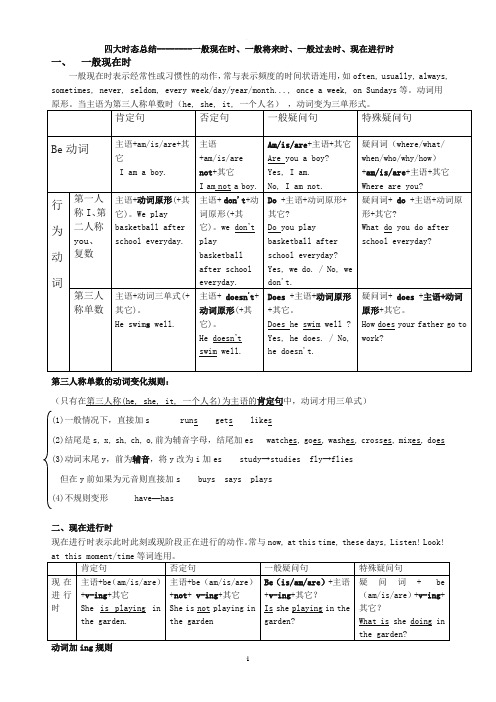
四大时态总结--------一般现在时、一般将来时、一般过去时、现在进行时一、一般现在时一般现在时表示经常性或习惯性的动作,常与表示频度的时间状语连用,如often, usually, always, sometimes, never, seldom, every week/day/year/month..., once a week, on Sundays等。
动词用第三人称单数的动词变化规则:(只有在第三人称(he, she, it, 一个人名)为主语的肯定句中,动词才用三单式)(1)一般情况下,直接加s runs gets likes(2)结尾是s, x, sh, ch, o,前为辅音字母,结尾加es watches, goes, washes, crosses, mixes, does(3)动词末尾y,前为辅音,将y改为i加es study→studies fly→flies但在y前如果为元音则直接加s buys says plays(4)不规则变形 have—has二、现在进行时现在进行时表示此时此刻或现阶段正在进行的动作。
常与now, at this time, these days, Listen! Look!动词加ing规则(1)直接在动词后加ing. going, starting, working.(2)去掉词尾不发音的e,再加ing. leave--leaving, make---making.注意:如果单词结尾的e发音,则不能去掉,也直接加ing. see –seeing agree - agreeing .(3) 对于动词只有一个元音,而其后跟了一个辅音字母时,双写末尾辅音字母再加ing.sitting, beginning run –running stop –stopping cut –cutting control –controlling(4)以ie结尾,把ie变y再加ing。
一般现在时,一般过去时,一般将来时及现在进行时
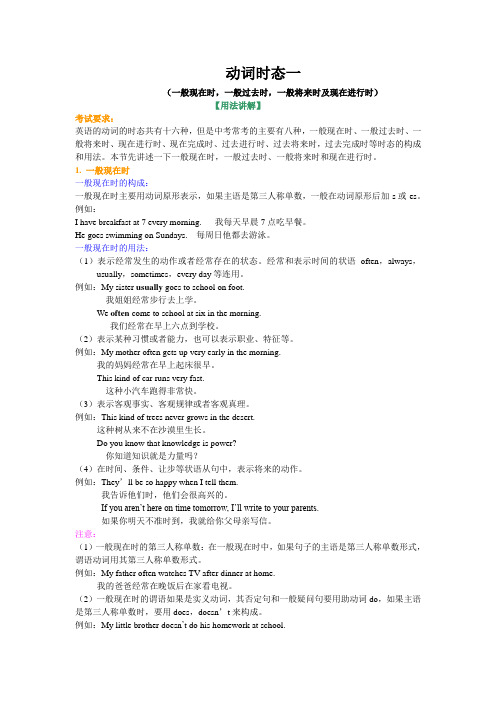
动词时态一(一般现在时,一般过去时,一般将来时及现在进行时)【用法讲解】考试要求:英语的动词的时态共有十六种,但是中考常考的主要有八种,一般现在时、一般过去时、一般将来时、现在进行时、现在完成时、过去进行时、过去将来时,过去完成时等时态的构成和用法。
本节先讲述一下一般现在时,一般过去时、一般将来时和现在进行时。
1. 一般现在时一般现在时的构成:一般现在时主要用动词原形表示,如果主语是第三人称单数,一般在动词原形后加-s或-es。
例如:I have breakfast at 7 every morning. 我每天早晨7点吃早餐。
He goes swimming on Sundays. 每周日他都去游泳。
一般现在时的用法:(1)表示经常发生的动作或者经常存在的状态。
经常和表示时间的状语often,always,usually,sometimes,every day等连用。
例如:My sister usually goes to school on foot.我姐姐经常步行去上学。
We often come to school at six in the morning.我们经常在早上六点到学校。
(2)表示某种习惯或者能力,也可以表示职业、特征等。
例如:My mother often gets up very early in the morning.我的妈妈经常在早上起床很早。
This kind of car runs very fast.这种小汽车跑得非常快。
(3)表示客观事实、客观规律或者客观真理。
例如:This kind of trees never grows in the desert.这种树从来不在沙漠里生长。
Do you know that knowledge is power?你知道知识就是力量吗?(4)在时间、条件、让步等状语从句中,表示将来的动作。
例如:They’ll be so happy when I tell them.我告诉他们时,他们会很高兴的。
英语最基本的五个时态
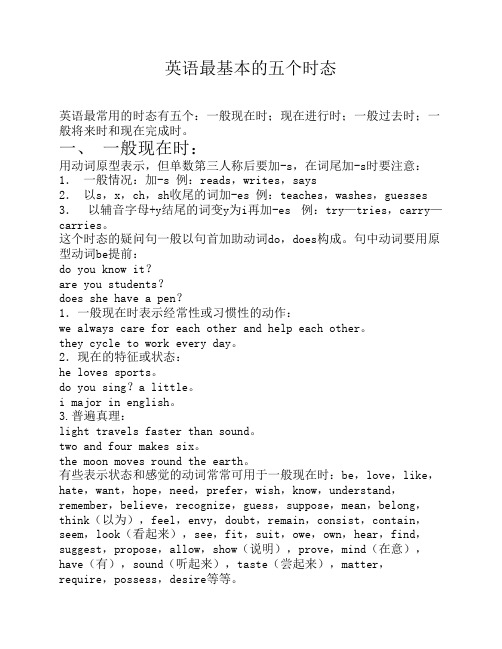
英语最基本的五个时态英语最常用的时态有五个:一般现在时;现在进行时;一般过去时;一般将来时和现在完成时。
一、 一般现在时:用动词原型表示,但单数第三人称后要加-s,在词尾加-s时要注意:1. 一般情况:加-s 例:reads,writes,says2. 以s,x,ch,sh收尾的词加-es 例:teaches,washes,guesses 3. 以辅音字母+y结尾的词变y为i再加-es 例:try—tries,carry—carries。
这个时态的疑问句一般以句首加助动词do,does构成。
句中动词要用原型动词be提前:do you know it?are you students?does she have a pen?1.一般现在时表示经常性或习惯性的动作:we always care for each other and help each other。
they cycle to work every day。
2.现在的特征或状态:he loves sports。
do you sing?a little。
i major in english。
3.普遍真理:light travels faster than sound。
two and four makes six。
the moon moves round the earth。
有些表示状态和感觉的动词常常可用于一般现在时:be,love,like,hate,want,hope,need,prefer,wish,know,understand,remember,believe,recognize,guess,suppose,mean,belong,think(以为),feel,envy,doubt,remain,consist,contain,seem,look(看起来),see,fit,suit,owe,own,hear,find,suggest,propose,allow,show(说明),prove,mind(在意),have(有),sound(听起来),taste(尝起来),matter,require,possess,desire等等。
一般现在时,现在进行时,一般将来时
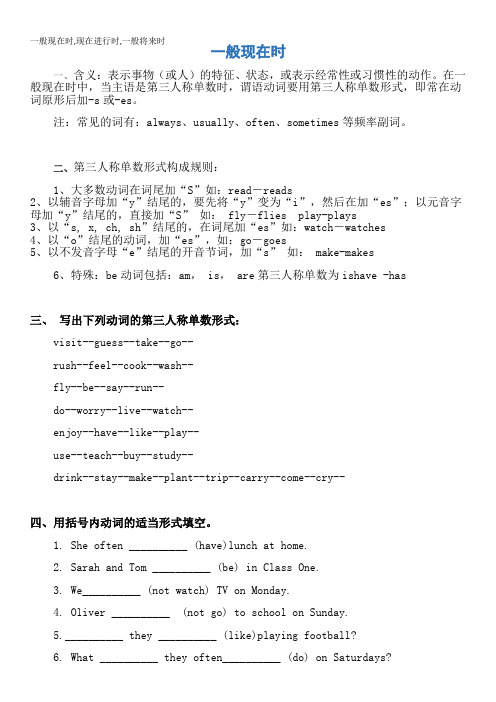
一般现在时,现在进行时,一般将来时一般现在时一、含义:表示事物(或人)的特征、状态,或表示经常性或习惯性的动作。
在一般现在时中,当主语是第三人称单数时,谓语动词要用第三人称单数形式,即常在动词原形后加-s或-es。
注:常见的词有:always、usually、often、sometimes等频率副词。
二、第三人称单数形式构成规则:1、大多数动词在词尾加“S”如:read-reads2、以辅音字母加“y”结尾的,要先将“y”变为“i”,然后在加“es”;以元音字母加“y”结尾的,直接加“S” 如: fly-flies play-plays3、以“s, x, ch, sh”结尾的,在词尾加“es”如:watch-watches4、以“o”结尾的动词,加“es”,如:go-goes5、以不发音字母“e”结尾的开音节词,加“s” 如: make-makes6、特殊:be动词包括:am, is, are第三人称单数为ishave -has三、写出下列动词的第三人称单数形式:visit--guess--take--go--rush--feel--cook--wash--fly--be--say--run--do--worry--live--watch--enjoy--have--like--play--use--teach--buy--study--drink--stay--make--plant--trip--carry--come--cry--四、用括号内动词的适当形式填空。
1. She often __________ (have)lunch at home.2. Sarah and Tom __________ (be) in Class One.3. We__________ (not watch) TV on Monday.4. Oliver __________ (not go) to school on Sunday.5.__________ they __________ (like)playing football?6. What __________ they often__________ (do) on Saturdays?7. __________ your parents __________ (read) newspapers?8. The girl__________ (teach) us English on Sundays.9. She and I __________ (take) a walk together every evening.10. There __________ (be) some water in the bottle.11. Mike__________ (like) cooking.12. He__________ (have) two new books.13. My sister __________ (look) after her baby carefully.14. You always __________ (do) your homework well.15. I__________ (be) ill. I’m staying in bed.16. She __________ (go) to school from Monday to Friday.17. Liu Tao __________ (do) not like PE.18. The child often __________ (watch) TV in the evening.19. -What day __________(be) it today?-It’s Saturday20.-How__________Dad __________(feel)?-He __________(feel) not well.21.-Where__________ he __________(work)?-He __________(work) at sea.现在进行时一、含义:表示正在做某事。
一般现在时-现在进行时-一般将来时

1一般现在时( Present Simple)2。
现在进行时(Present Continuous)3. 将来的安排和打算( Future Arrangements and Intentions)一、一般现在时、现在进行时(一)、辨”个性”一般现在时表示经常性或习惯性的动作,以及主语的特征或状态。
1。
表示主语现在的状态或特征。
例如:I am a teacher.We have a very good relationship with our parents.2。
表示经常性或习惯性动作。
例如:My father goes to work by bike every day。
I always leave home for school at 6:303 。
表示自然现象,普遍真理,客观存在或科学事实。
例如:Shanghai lies in the east of China.The earth moves around the sun.现在进行时表示现在或现阶段正在进行的动作。
例如:1。
表示现在(指说话人说话时)正在发生的事情We are waiting for you at the moment。
2. 表示现阶段正在进行或发生的动作President Xi is visiting in the USA these days。
(二)、辨结构一般现在时的结构是:主 + 动词原形或动词的第三人称单数形式 +...。
.。
现在进行时的结构是: 主 + be(are/ is/am),动词的—ing形式+.。
...。
(三)、辨”信息词"一般现在时常和以下这些时间状语连用:always, often, usually=normally, sometimes=at times, regularly, seldom, never, hardly ever, from time to time, once a month, every day, on Sundays。
如何区分一般现在时
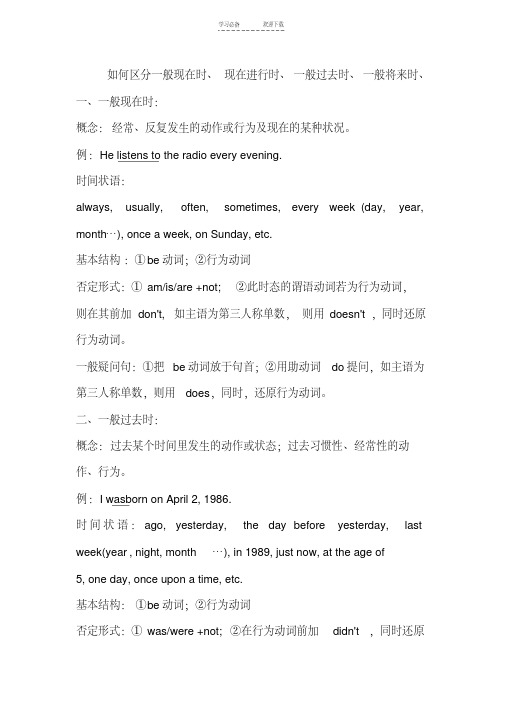
如何区分一般现在时、现在进行时、一般过去时、一般将来时、一、一般现在时:概念:经常、反复发生的动作或行为及现在的某种状况。
例:He listens to the radio every evening.时间状语:always, usually, often, sometimes, every week (day, year, month…), once a week, on Sunday, etc.基本结构:①be动词;②行为动词否定形式:①am/is/are +not;②此时态的谓语动词若为行为动词,则在其前加don't,如主语为第三人称单数,则用doesn't,同时还原行为动词。
一般疑问句:①把be动词放于句首;②用助动词do提问,如主语为第三人称单数,则用does,同时,还原行为动词。
二、一般过去时:概念:过去某个时间里发生的动作或状态;过去习惯性、经常性的动作、行为。
例:I wasborn on April 2, 1986.时间状语:ago, yesterday, the day before yesterday, last week(year, night, month…), in 1989, just now, at the age of5, one day, once upon a time, etc.基本结构:①be动词;②行为动词否定形式:①was/were +not;②在行为动词前加didn't,同时还原行为动词。
一般疑问句:①was或were放于句首;②用助动词do的过去式did 提问,同时还原行为动词。
三、现在进行时:概念:表示现阶段或说话时正在进行的动作及行为。
时间状语:at the monment look listen\now例:The woman is talking to the doctor.时间状语:now, at this time, these days, etc.基本结构:am /is/are +doing否定形式:am /is/are +not +doing.一般疑问句:把be动词放于句首。
- 1、下载文档前请自行甄别文档内容的完整性,平台不提供额外的编辑、内容补充、找答案等附加服务。
- 2、"仅部分预览"的文档,不可在线预览部分如存在完整性等问题,可反馈申请退款(可完整预览的文档不适用该条件!)。
- 3、如文档侵犯您的权益,请联系客服反馈,我们会尽快为您处理(人工客服工作时间:9:00-18:30)。
一般现在时含义:表示事物(或人)的特征、状态,或表示经常性或习惯性的动作。
在一般现在时中,当主语是第三人称单数时,谓语动词要用第三人称单数形式,即常在动词原形后加-s或-es。
注:常见的词有:always、usually、often、sometimes等频率副词。
第三人称单数形式构成规则:1、大多数动词在词尾加“S”如:read-reads2、以辅音字母加“y”结尾的,要先将“y”变为“i”,然后在加“es”;以元音字母加“y”结尾的,直接加“S” 如:fly-flies play-plays3、以“s, x, ch, sh”结尾的,在词尾加“es”如:watch-watches4、以“o”结尾的动词,加“es”,如:go-goes5、以不发音字母“e”结尾的开音节词,加“s” 如:make-makes6、特殊:be动词包括:am,is,are第三人称单数为ishave -has三、写出下列动词的第三人称单数形式:visit--guess--take--go--rush--feel--cook--wash--fly--be--say--run--do--worry--live--watch--enjoy--have--like--play--use--teach--buy--study--四、用括号内动词的适当形式填空。
1. She often __________ (have)lunch at home.2. Sarah and Tom __________ (be) in Class One.3. We__________ (not watch) TV on Monday.4. Oliver __________ (not go) to school on Sunday.5.__________ they __________ (like)playing football?6. What __________ they often__________ (do) on Saturdays?7. __________ your parents __________ (read) newspapers?8. The girl__________ (teach) us English on Sundays.9. She and I __________ (take) a walk together every evening.10. There __________ (be) some water in the bottle.11. Mike__________ (like) cooking.12. He__________ (have) two new books.13. My sister __________ (look) after her baby carefully.14. You always __________ (do) your homework well.15. I__________ (be) ill. I’m staying in bed.16. She __________ (go) to school from Monday to Friday.17. Liu Tao __________ (do) not like PE.18. The child often __________ (watch) TV in the evening.19. -What day __________(be) it today?-It’s Saturday-How__________Dad __________(feel)?-He __________(feel) not well.-Where__________ he __________(work)?-He __________(work) at sea.现在进行时含义:表示正在做某事。
注:常见的词有:now现在、look看、listen听等。
现在进行时的构成:am/is/ are+ v-ing是现在进行时的构成形式v-ing现在分词的构成:总结小学阶段需要双写最后一个字母再加ing的现在分词:let put sit , stop shop , forget get , begin jog run swim(让我们放下来,坐下来,停止购物,忘记取得,开始跑跑跳跳)letting putting sitting stopping shopping forgetting getting beginning jogging running swimming写出下列动词的现在分词形式:visit--put--take--go--get--see--cook--wash--fly--let--say--swim--do--sit--live--watch--enjoy--have--run--play--use--teach--buy--study--三、用所给的动词的正确形式填空:1.The boy __________________ ( draw)a picture now.2. Listen .Some girls __________________( sing)in the classroom .3. My sister __________________ ( swim ) now.4. What __________ you__________( do ) now?5. Look . They __________________ ( have) an English lesson .6.They__________________ (not ,water) the flowers now.7.Look! The girls__________________ (dance )in the classroom .8.What is Tom doing? She __________________ (listen ) to music.9.It’s 5:00 now. I__________________ (run).10.Hear!The bird__________________(sing).一般将来时一:含义:表示将来计划、准备、打算做某事。
二:标志词:tonight今晚,tomorrow明天,the day after tomorrow后天,this morning/afternoon/evening今天早上/下午/晚上,next week/weekend/month/year下一周/下一周末/下个月/下年, in two years两年后, three days later三天以后等。
三:结构:will/shall+do(动词原形)(will可用于所有人称,shall只用于第一人称I 和we)be going to+do(动词原形)(be--am/is/are根据主语的变化而变化)四、练习:填空。
1. 我打算明天和朋友去野炊。
I_____ _______ _________ have a picnic with my friends.I ________ have a picnic with my friends.2. 下个星期一你打算去干嘛? 我想去打篮球。
What ________ ________ _________ _________ _________ next Monday?I _______ ______ _____ play basketball.What _________ you do next Monday? I ________ play basketball.3. 你妈妈这个周末去购物吗?是,她要去买一些水果。
_____ your mother _______ ________ go shopping this ___________? Yes, she _________.She ______ ________ __________ buy some fruit.4. 你们打算什么时候见面。
What time _______ you _________ __________ meet?五、改句子。
1、Tom is going to go camping.(改否定)→ Tom ________ going to go camping.2. I’ll go and join them.(改否定)→ I _______ go ______ join them.3. I’m going to get up at 6:30 tomorrow.(改为一般疑问句)→________ _______ ________ to get up at 6:30 tomorrow?We will meet at school at 10:30.(改为一般疑问句)→_______ ________ meet at the bus stop at 10:30.. She is going to listen to music after school.(对划线部分提问)→________ _______ she ________ ________ _________ after school?六:用所给词的适当形式填空。
Today is a sunny day. We ___________________ (have) a picnic this afternoon.2. My brother _______________ (go) to Shanghai next week.3. Tom often ______________(go) to school on foot. But today is rain. He _____ _________ (go) to school by bike.4. What do you usually do at weekends? I usually ________ (watch) TV.5. It’s Friday today. What _____she _________ (do) this weekend? She _______ ____(watch) TV .名词的复数形式1.一般情况下,直接加-s,如:book-books, bag-bags, cat-cats,house-houses2.以s. x. sh. ch结尾,加-es,如:bus-buses, box-boxes, watch-watches3.以“辅音字母+y”结尾,变y为i, 再加-es;以“元音字母+y”结尾,直接加-s 如:family-families, toy-toys4.以-o结尾,一般在词尾加-es.如:tomato-tomatoes,potato-potatoes5.以“f或fe”结尾,变f或fe为v, 再加-es,如:knife-knives,wife-wives等6.不规则名词复数:(1)特殊变换:man-men, woman-women, policeman-policemen, policewoman-policewomen, mouse-mice,child-children,foot-feet,.tooth-teeth(2)单复数同行:fish-fish, people-people, Chinese-Chinese,Japanese-Japanese sheep-sheep bread-bread等等。
